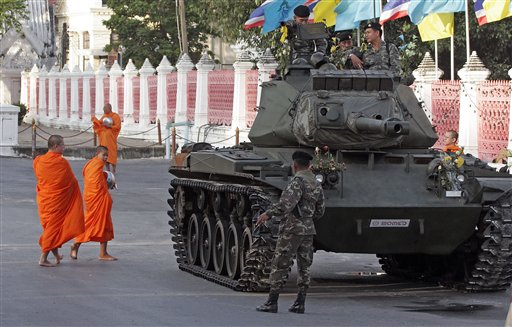It's been a long year so far for Thailand, where early this morning, the Thai military came over the airwaves to announce they had taken control of the government and were suspending the constitution. This came just two days after their announcement of martial law, which many saw as the harbinger of an inevitable coup. Now, media is being censored, a curfew has been put in place, and government officials have been shuttled to a camp set up to hold them while the unrest persists.
Today's coup has been a long time coming. The last successful coup in the country occurred in 2006, when populist billionaire Prime Minister Thaksin Shinawatra was overthrown by the military, who then dissolved parliament, and hastily rewrote the constitution after installing a new interim government it found to be more favorable. The backlash against the 2006 coup from across the country came to a boiling point in 2010, when deadly clashes between civilians and security forces took place in Bangkok. Mr. Shinawatra had built up a large support group, primarily in the rural north of Thailand, and his disposal from government was the catalyst for significant unrest for years. Several governments revolved through the leadership during this time, many of which were mired in corruption scandals, prosecutions, and other serious governing problems.
In 2011, Yingluck Shinawatra, Thaksin's sister, was elected Prime Minister in a landslide victory. However, after several controversial moves, including giving her brother political amnesty, Ms. Shinawatra was removed from office by the judiciary earlier this year, again sparking backlash from much of the Thai constituency. That conflict has remained unsolved for months, as the military has cautiously and carefully tried to prevent violence and restore order via dialogue between the interim government and Shinawatra's Pheu Thai Party.
What is most disturbing about Thailand's predicament is not the substance of the unrest today, but rather that it is highly indicative of a culture that has remained pervasive throughout South Asia for decades. Today's coup is not an incident that can be analyzed in isolation, Thailand's problems identified, and a solution rendered in that country alone. The Thai coup is emblematic of a systemic, regional culture of authoritarian governance. Authoritarianism is nothing new to the states in Southeast Asia: Indonesia was under authoritarian rule up until 1998, and underwent a genocide in the 1960s that claimed an estimated 500,000 lives; Cambodia was under authoritarian rule until 1997, and in the 1970s underwent an even worse genocide, in which an estimated 2 million - or, at the time, a quarter of the population - people were killed. And as of today, Thailand has seen 19 military coups in the 82 years since gaining its independence in 1932, 12 of which have been successful. This is just another figurative notch on the bedpost.
And, like all the rest, this coup will have grave economic ramifications for Thailand, which has in recent years become an industrial powerhouse in the region. Stock prices have declined, and the currency is not faring as well as it has in past months. The longer the country goes without clear leadership, the more damaging the long-term effects will be.

No comments:
Post a Comment